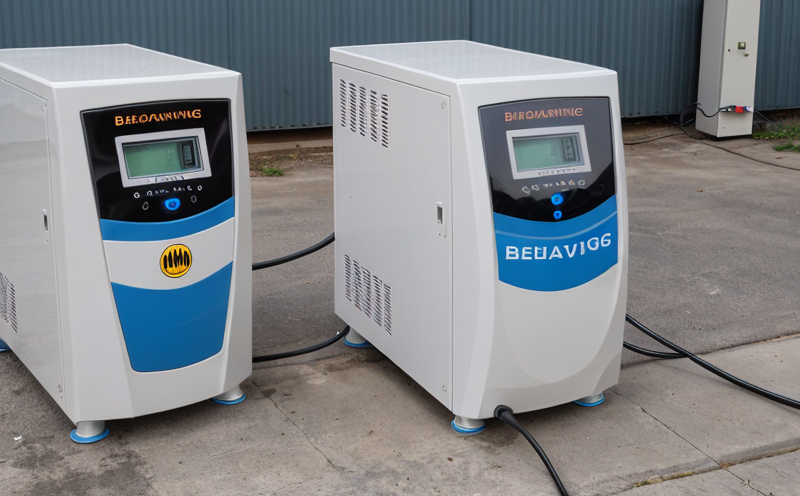ASTM F3117 Charging and Discharging Testing of Primary Lithium Cells for Medical Devices
The ASTM F3117 standard provides a comprehensive framework for the charging and discharging testing of primary lithium cells intended for use in medical devices. This stringent protocol ensures that these critical components meet rigorous performance, safety, and reliability criteria essential for healthcare applications.
Primary lithium cells are used in a variety of medical devices due to their high energy density, long shelf life, and lightweight properties. However, the unique nature of primary lithium cells necessitates careful handling during charging and discharging processes to prevent degradation, ensure consistent performance, and guarantee safety. ASTM F3117 addresses these requirements by specifying precise test procedures that simulate real-world conditions under which these devices will operate.
The testing protocol outlined in this standard covers a range of critical parameters including initial charging, subsequent charge cycles, discharge tests at various rates, and storage periods to evaluate stability over time. Compliance with ASTM F3117 is crucial for manufacturers as it not only ensures the quality of their products but also facilitates regulatory compliance and international market access.
One of the key aspects of this testing procedure involves the precise control of charging and discharging conditions such as voltage, current, temperature, and time. These parameters are critical in assessing how well the cells perform under different stress levels that they might encounter during their lifecycle within medical devices. The standard also emphasizes the importance of accurate monitoring tools and methods to ensure reliable data collection.
Another important element is the evaluation of cell behavior over multiple charge-discharge cycles, which helps identify any potential performance degradation or safety issues early on. This long-term testing capability allows for the identification of weak points in design or manufacturing processes that could lead to failures in real-world usage scenarios. Additionally, the standard includes provisions for evaluating the cells' thermal stability and mechanical integrity through controlled environmental stress tests.
The significance of ASTM F3117 cannot be overstated given its role in ensuring product reliability and safety in a highly regulated industry like healthcare. By adhering to these stringent testing protocols, manufacturers can enhance their reputation by delivering products that meet the highest standards of quality and performance. This not only enhances customer trust but also opens doors for broader market penetration.
Furthermore, compliance with ASTM F3117 provides significant benefits beyond mere regulatory requirements. It serves as a benchmark that distinguishes high-quality products from substandard alternatives, thereby boosting brand loyalty among healthcare professionals and patients alike. The detailed nature of the testing ensures consistent results across different batches or models, which is crucial for maintaining product consistency throughout production runs.
Given the complexity involved in developing reliable primary lithium cells for medical devices, thorough validation through ASTM F3117 testing becomes indispensable. This standard plays a pivotal role not just in ensuring compliance with international regulations but also in fostering innovation by setting benchmarks that push technological boundaries forward. By embracing such standards early on in their development processes, manufacturers can stay ahead of competitors and meet increasingly stringent regulatory demands effectively.
Benefits
Compliance with ASTM F3117 offers numerous advantages to manufacturers operating within the medical device sector. Firstly, it ensures that primary lithium cells used in these devices are subjected to rigorous testing conditions that mimic actual operational environments. This approach helps identify potential weaknesses early on, allowing for timely corrections and improvements before mass production begins.
Secondly, adherence to this standard enhances product reliability by validating cell performance across multiple charge-discharge cycles. Such thorough validation builds confidence among end-users regarding the longevity and dependability of the batteries powering their medical devices. This increased trust translates into better customer satisfaction and stronger brand loyalty.
Thirdly, meeting ASTM F3117 requirements demonstrates a commitment to quality control practices that align with international best practices. This alignment is particularly beneficial when targeting global markets where stringent regulatory compliance is essential for entry or continued presence.
In addition to these direct benefits, there are indirect advantages as well. For instance, participating in the ASTM F3117 certification process can help streamline communication between various stakeholders involved in product development and manufacturing. Clear guidelines provided by this standard facilitate smoother collaboration among engineers, quality assurance teams, regulatory affairs departments, etc., leading to more efficient workflows overall.
Moreover, compliance with ASTM F3117 contributes positively towards reducing risks associated with product failures or malfunctions that could potentially harm patients. By ensuring robust testing procedures are followed during manufacturing stages, companies minimize the likelihood of such incidents occurring once the devices reach end-users.
The certification also serves as a powerful marketing tool that sets brands apart from competitors by showcasing their adherence to industry-leading standards. Potential customers appreciate knowing they are investing in products manufactured according to stringent specifications designed specifically for demanding medical applications.
International Acceptance and Recognition
- ISO/IEC 17025: Laboratories accredited under ISO/IEC 17025 are recognized globally as meeting specific requirements concerning technical competence, quality management systems, and personnel qualifications. This accreditation ensures that testing facilities adhering to ASTM F3117 standards maintain high levels of accuracy, precision, and reliability.
- EN 60489: European standard for safety of batteries used in electrical equipment, this certification aligns with ASTM F3117 requirements by emphasizing the importance of proper charging and discharging practices to avoid hazards.
- IATA Regulations: International Air Transport Association regulations mandate strict handling procedures for lithium batteries. Compliance ensures safe transportation across borders without compromising on performance or safety standards established by ASTM F3117.
- IEC 62196: This standard covers the interfaces and protocols for connecting portable power sources to chargers, which directly supports the charging behavior testing outlined in ASTM F3117. It ensures compatibility between different components involved in the charging process.





